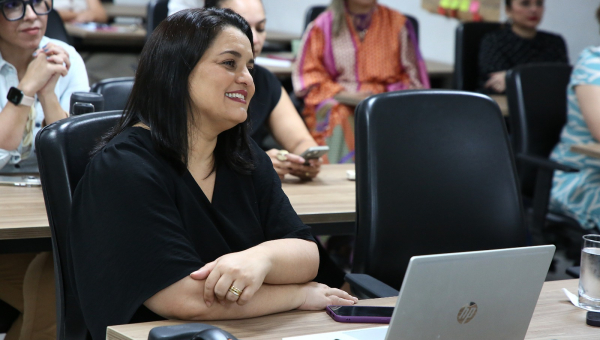
The Superior School of the Judges of the State of Tocantins (Esmat) kicked off the Training on Women Leadership on Wednesday (December 4th). The course brings together female magistrates and civil servers from the Judiciary of the State of Tocantins with a goal that goes beyond technical training: to build bridges to leadership with equity, purpose and a vision of the future.
At the opening of the training, Justice Ângela Prudente emphasized the importance of the initiative, while Ana Beatriz Pretto, Executive Director, stressed the transformative role of the project.
“This initiative reinforces the importance of strengthening the culture of female leadership in the legal sphere, promoting equal opportunities, empowerment and the improvement of essential skills for the exercise of strategic functions. In addition, programs like this contribute to build a more inclusive and representative institutional environment,” she said.
The training, coordinated by Ana Carina Mendes Souto, General Director of the Court of Justice of the State of Tocantins (TJTO), is in direct line with the National Policy to Encourage Institutional Female Participation in the Judiciary, a guideline of the National Council of Justice (CNJ), which seeks to overcome the historical barriers that still stand in the way of many women. In addition to fulfill an institutional role, the course is a space for individual and collective empowerment, an invitation to reflection and protagonism.
The methodology of the program is based on a hybrid approach, mixing face-to-face WORKSHOPS led by specialist Simone Murata with asynchronous activities. Among the topics covered are self-knowledge, strategic career planning, high emotional performance and protagonist leadership - skills that resonate both in the legal environment and in the personal life of each participant.
In a statement, Roberta Maciel, a civil server registered in the training, described her first impressions with enthusiasm: “the training will give us access to content, tools and the experiences of other female colleagues and managers, which will help me inspire other people to act collaboratively to improve our work processes,” she shared.
Between now and February of 2025, these women will share learning, exchange experiences and together they will build a new chapter in the history of the Justice of the state of Tocantins. And perhaps beyond.




_thumbnail_thumbnail.jpeg)
_thumbnail_thumbnail.jpeg)
_thumbnail_thumbnail.jpeg)
_thumbnail_thumbnail.jpeg)
_thumbnail_thumbnail.jpeg)
_thumbnail_thumbnail.jpeg)
_thumbnail_thumbnail.jpeg)

_thumbnail.jpeg)
_thumbnail.jpeg)
_thumbnail.jpeg)
_thumbnail.jpeg)
_thumbnail.jpeg)
_thumbnail.jpeg)
_thumbnail.jpeg)

